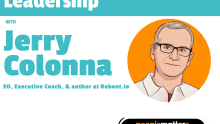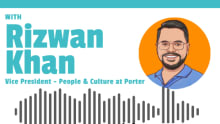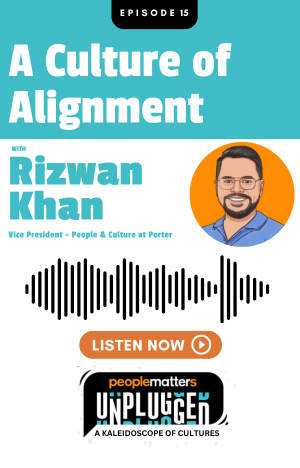How the 'Great Resignation' can become the 'Great Recruitment': Soitec's Pascal Lobry

READ the full interview in the December 2021 issue of our magazine: Work in 2022: What's Next?
People are the drivers of business growth more than ever, but the pandemic has made it very difficult for many companies to find and keep the talent they need. In a time when meeting workers' needs is central to supporting business strategy, the approach to talent management and indeed the entire worldview of what is important in the workplace has to change, says Pascal Lobry, Executive Vice President, People & Sustainability at Soitec.
Pascal joined Soitec in 2015 and oversees the change strategies of the company's people and sustainability aspects. He previously served as HR director for several major international firms including SPIE Oil & Gas Services, Valeo and Galderma, and worked closely with management teams on the transformations of business strategies and organisations. A graduate of ESSEC Business School, he regularly teaches at the master's level in human resources management, most notably at Sciences Po.
Here are the excerpts of what he told us.
What are some of the most critical preparations that leaders should make for 2022?
The global pandemic was a wake-up call for companies to address their workforce’s general well-being, in particular their mental health, as working from home became the default mode. Companies need to adopt enlightened, progressive and adaptable approaches to sustainably and effectively manage their talent.
At Soitec, we aim to double our current headcount of 1,850 by 2026. Our focus is therefore on making ourselves an attractive employer to support our growth. We are rolling out intensive employer branding initiatives to highlight our employee value proposition and assure new employees that one; they will enjoy a good quality of work-life balance and two; diversity and inclusion are not an afterthought. One of the key policies we leverage is sharing value creation with our employees by making them shareholders in our Group, so that they too will benefit from the company's performance.
What have been the biggest lessons this pandemic has highlighted in terms of the culture of innovation and adaptability? How will this play out in 2022?
The pandemic has disrupted companies’ business-as-usual routines and compelled them to pivot online and leverage technology to compensate for the social distancing restrictions. Overnight, companies had to accelerate their digitalisation while their workforces had to brave the steep learning curve of learning how to use new digital solutions and mobile applications.
For innovation and adaptability to be pervasive within an organisation, there must be a whole-of-company approach to adopting technology. This means that digital skill is not a good-to-have but a must-have, with buy-in from all levels of the organisation.
Secondly, an organisation has to acknowledge that a culture of innovation does not exist in an instant but time has to be allowed for mindsets and paradigm shifts to be affected.
For example, anecdotes abound of companies which experimented with numerous video conferencing solutions and experienced shortfalls before settling on one which suited their needs.
What's your advice on how to best leverage technology for competitive advantage?
Technology is only as effective as its users, or rather, how users harness technology. To lay a strong foundation for digital transformation, an organisation needs to create an environment in which trust can be extended to, and expected from, all stakeholders. This is especially crucial as employees are working remotely while having to deliver what is expected of them, notwithstanding the challenging work environment.
An organisation has to balance the need to trust their remote workforce while expecting accountability from them. In practical terms, this means an organisation extends its workforce the latitude to operate within negotiated boundaries while maintaining a hands-off policy of constantly monitoring their employees’ activities.
Companies which operate without trust will risk alienating and disenchanting their workforce in the long run, something which they want to avoid as economies gradually reopen and job opportunities rise.
What are your thoughts on how to align organisational goals with sustainability efforts?
The impetus for aligning our organisational goals with sustainability efforts are clear cut for us. The semiconductor materials we design and manufacture are used by 80% of the world. This places a very huge responsibility on us to make the world better, to facilitate numerous technological advances that are impacting an ever-expanding range of expectations in the fields of communication, mobility and intelligence in connected objects.
We leverage our position to influence stakeholders for the long-term good of our world. For example, we are getting our customers to support our pledge to source all raw materials under recognised international guidelines and abide by the Responsible Business Alliance’s Code of Conduct for corporate social responsibility in global supply chains.
Our sustainability focus is wide ranging. We are among the first four companies worldwide in the semiconductor industry that have committed to reducing greenhouse gas emissions to limit the global warming of the planet to 1.5°C and are committed to the Science-Based Targets Initiative. We also serve as a catalyst to work with industries, customers and suppliers to set up high ethical standards for a more sustainable future and build sustainable supply chains and create resilient ecosystems where they operate.
What is Soitec doing differently to enhance the employee experience for the workforce?
We have found that little gestures go a long way. For example, with WFH being the norm, we have enabled our staff to work remotely from their homes by providing them with the necessary IT tools and support. In Singapore for example, we have taken the step to help our colleagues from Malaysia who cross the border for work daily to defray their accommodation costs in Singapore while the land border with Malaysia remains closed. This gesture has helped to instil loyalty and commitment to the company.
Partly because of what we are doing for our Malaysian colleagues, they are also encouraging their relatives and friends to join Soitec.
During this pandemic we have not let up on our internal training but have intensified our talent development and upskilling programs. This year, we conducted a career assessment for the first time for more than 1,400 of our staff.
Having the pandemic upend our normal work routines did not prevent us from striving to create a fulfilling and rewarding work environment and promote employee well-being. We adopt an uncompromising stand with regard to health and safety issues to ensure that our employees have the optimum environment to work in. This even extends to enhancing workstation ergonomics.
Far from experiencing the Great Resignation, we are witnessing the Great Recruitment! We have already recruited nearly 300 new employees in the first half of the fiscal year and we aim to recruit another 200 by the end of March 2022.
How are you going to fulfil the sophisticated demands of all your stakeholders, including your employees?
Our engagements with our stakeholders are an ongoing, dynamic, and long-term process. With regards to our employees, we are committed to making Soitec an employer of choice by pursuing several approaches. Firstly, we actively promote an inclusive and diverse work environment and eliminate all forms of discrimination. To this end, we aim to increase the representation of women in our top management from the current 18% to 25% by fiscal year 2025. During the same period, we also want to raise the percentage of women in our global workforce from 34% currently to 40%.
Secondly, we endeavour to guarantee safety in both our products and our workplaces by working towards a ‘Zero Accident’ safety culture. Thirdly, as the ongoing pandemic has demonstrated, we have actively protected our employees and ensured continuing operations as part of our business continuity practices.
Lastly, we believe in sharing the fruits of our success with our employees. Through our employee stock ownership plan, 100% of our eligible employees are proud owners of Soitec shares.














